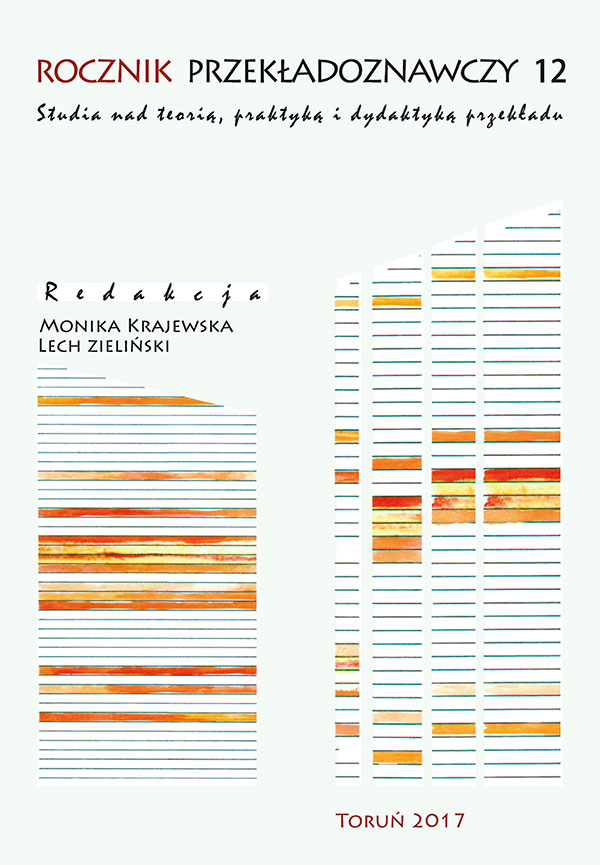Some Remarks on the Perspective of Translating Tanizaki Jun’ichirō’s Kagi from Japanese to Polish
DOI:
https://doi.org/10.12775/RP.2017.005Keywords
Tanizaki Jun’ichirō, Kagi, translating Japanese literature, translations of Japanese literature, Japanese prose in translationAbstract
This article aims at presenting and discussing problems and difficulties that a translator of Kagi – a novel written in 1956 by the Japanese author Tanizaki Jun’ichirō (1886–1965) may face in translating from Japanese to Polish. By providing specific examples from the Japanese text, decisions that sometimes the translator must take are explained; these decisions derive from situations when the translator is confronted with the problem of untranslatability or cultural context of two such distant cultures as the Japanese and Polish ones. Operating between two such different cultures, the translator in fact intentionally becomes an intercultural intermediary – as Soliński suggests, and a cultural advisor – as Jabłoński claims. While focusing on lexical, grammatical, contextual and technical (distinctive features of the Japanese language e.g. writing systems) aspects of untranslatability, some excerpts of the Japanese text are analysed and examples of Polish equivalents are provided. It should be added that it is difficult to analyse the translation of a text that has not been published yet and officially does not exist. However, it seems the comments and solutions suggested here might be helpful or useful for those who will translate Japanese literature in the future in general, as some of these observations can be applicable not only to Kagi. The proposed solutions are certainly not perfect, thay can be a starting point for further discussions. Finally, the approach described above also provides an opportunity to consider certain technical aspects of the translation in order to demonstrate problems encountered by translators of literature in general.
References
Dąbrowska A., 2002, „Stereotypy polskiego słownictwa erotycznego”, [w:] Język, stereotyp, przekład, E. Skibińska, M. Cieński (red.), Wrocław, s. 169–175.
Dąmbska-Prokop, U., 2000, Mała encyklopedia przekładoznawstwa, Częstochowa.
Dzierżanowska, H., 1977, Tłumaczenie tekstów nieliterackich, Warszawa.
Gunji, T., 1987, Japanese Phrase Structure Grammar: A Unification-based Approach, Dordrecht.
Hayashi S. (red.), 2002, Reikai. Shinkokugo jiten, Tokio.
Kielar, B., 2003, Zarys translatoryki, Warszawa.
Kristeva, T., 2009, „ Another Key to Tanizaki’s Eroticism”, [w:] The Grand Old Man and the Great Tradition: Essays on Tanizaki Jun’ichirō in Honor of Adriana Boscaro, L. Bienati, B. Ruperti (red.), Ann Arbor, s. 71–80.
Jabłoński, A., 2013, Homeostaza Tekstu. Tłumaczenie i komunikacja mędzykulturowa w perspektywie polsko-japońskiej, Poznań.
Lewinson, J., 1999, Słownik seksualizmów polskich, Warszawa.
Lukszyn, J., 1997, Tezaurus terminologii translatorycznej, Warszawa.
Majewicz, A.F., 1989. Języki świata i ich klasyfikowanie, Warszawa.
Melanowicz, M., 2004, Japońskie narracje, studia o pisarzach współczesnych, Krakow.
Pieńkos, J., 2003, Podstawy przekładoznawstwa: od teorii do praktyki, Kraków.
Soliński, W., 1987, Przekład artystyczny a kultura literacka: komunikacja i metakomunikacja literacka, Wrocław.
Tanizaki, J., 1996, Kagi, Tokio.
Downloads
Published
Issue
Section
Stats
Number of views and downloads: 766
Number of citations: 0



